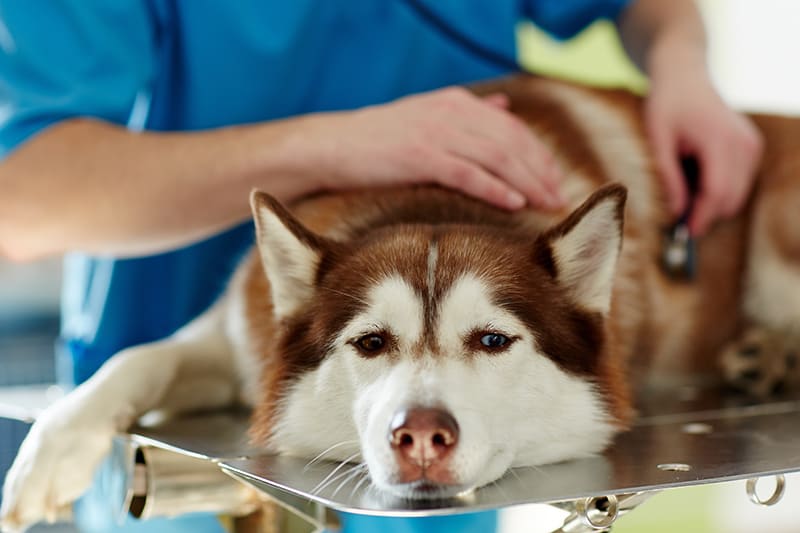What is hepatitis in dogs?
Hepatitis in dogs is classified into two categories:
Infectious Canine Hepatitis
Infectious canine hepatitis is an acute contagious disease caused by the canine adenovirus 1. This virus targets the spleen, kidneys, lungs, liver, lining of blood vessels and sometimes other organs. Symptoms can vary widely - from slight fever, thirst or apathy to death.
Canine Chronic Hepatitis
Canine chronic hepatitis is associated with infectious canine hepatitis. At some point, the dog's liver has become inflamed and necrosis (cell death) has occurred.
Dog breeds that seem to face an increased risk of developing this disease include Chihuahuas, Springer Spaniels, Beagles, Maltese, West Highland White Terriers, Cocker Spaniels, Labrador Retrievers, Bedlington Terriers, Skye Terriers, Doberman Pinschers, and Standard Poodles.
In some breeds, an accumulation of copper in the liver’s cells can result in chronic hepatitis. An excessive amount of copper can damage the liver’s cells and often leads to severe chronic hepatitis if left untreated.
Chronic means the infection has been damaging cells for some time (at least a few weeks). While acute hepatitis can manifest over just a few days.
Symptoms of Chronic Hepatitis in Dogs
Symptoms of chronic canine hepatitis can include:
- Sluggishness and lethargy
- Lack of appetite
- Weight loss
- Vomiting
- Seizures, mental dullness
- Increased urination
- Excessive thirst
- Yellowish gums and moist tissues
- Abdominal fluid buildup
- Poor body condition
Causes of Chronic Hepatitis in Dogs
Dogs can develop chronic hepatitis due to a number of causes including:
- Exposure to toxins
- Infectious disease
- Immune-mediated disease
- Copper-storage disease
- Environmental
- Drug related
Diagnosis of Chronic Hepatitis in Dogs
To begin, your vet will request a detailed history of your dog's health leading up to the onset of symptoms. Any information you can provide your veterinarian about your dog's genetic background and parentage will also be helpful.
Your vet will complete a thorough physical examination on your dog, including a blood chemical profile, a complete blood count (CBC), an electrolyte panel and a urinalysis. The bloodwork results will allow your veterinarian to look for indications of impaired kidney function.
In some cases, your vet may use X-ray and ultrasound imaging to visually examine the liver, or take a tissue sample for biopsy.
Treating Chronic Hepatitis in Dogs
Hospitalization will be necessary in severe cases so that your pup can be given fluid therapy supplemented with B vitamins, potassium and dextrose.
Restricted activity will also be necessary during the treatment and recovery phase. Your vet may or may not recommend complete cage rest depending on your dog's specific case. Be sure to keep your dog warm while they are inactive during their recovery period.
Medications may be prescribed by your vet to increase the elimination of fluids from the body, helping to decrease fluid build-up in the abdomen. Medications may also be necessary to treat infection, decrease brain swelling, control seizures, and decrease ammonia production and absorption.
A diet restricted in sodium, and supplemented with thiamine and vitamins should be served to your dog in several small meals a day (avoid 2 or 3 large meals). If your dog has lost their appetite and refuses to eat for more than 48 hours an intravenous feeding tube may be necessary to get your pet the nutrition they need to prevent further muscle wasting.
Chronic Hepatitis in Dogs - Life Expectancy
Chronic hepatitis in dogs is not curable however many dogs can live comfortably for months or even years with continued therapy. If your pup has chronic hepatitis they will need regular veterinary checkups to monitor their condition and ongoing treatment so they can enjoy a good quality of life, with minimal clinical signs.
Note: The advice provided in this post is intended for informational purposes and does not constitute medical advice regarding pets. For an accurate diagnosis of your pet's condition, please make an appointment with your vet.
Is your dog displaying symptoms of canine chronic hepatitis? Book an appointment today for your pup. Our Greensboro vets have experience diagnosing and treating a range of internal medicine conditions including hepatitis in dogs.
Looking for a vet in Greensboro?
We're always accepting new patients, so contact our veterinary hospital today to book your pet's first appointment.
Related Articles View All
What happens during a routine pet exam?
Routine wellness exams are a proactive way to help safeguard your pet's long-term health and vitality. Why should you take your healthy pet to the vet? What happens during a pet health wellness exam? Find out.
How much does an emergency vet visit cost?
Emergency veterinary care can be costly, but planning ahead allows you to make decisions about your pet's care based on their needs rather than financial restrictions. Today, we look at the cost of emergency vet care, and how to be ready if your pet needs emergency treatment.
Kidney Failure in Dogs
Chronic and acute kidney failure are serious health problems commonly seen in dogs. Here, you will learn about the differences between chronic and acute kidney failure in dogs, the signs to watch for and how these conditions are treated.
Signs of Bladder Infections in Dogs & How They Are Treated
Many dogs suffer from bladder infections and other issues affecting the urinary tract system. What causes bladder infection in dogs? What signs should you watch for? How do vets treat bladder infections in dogs? Read on to find out.


